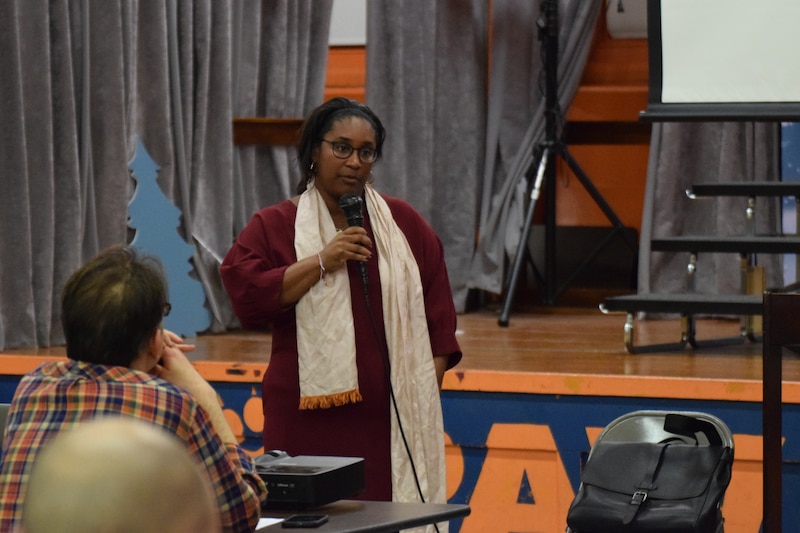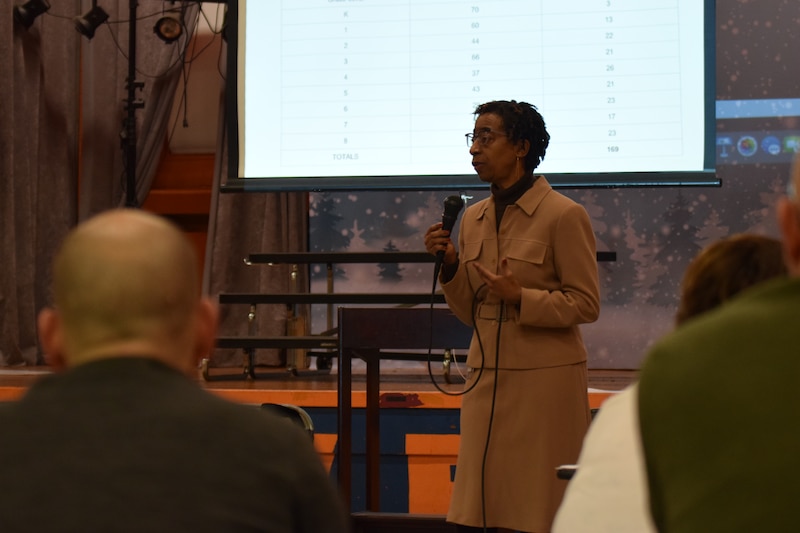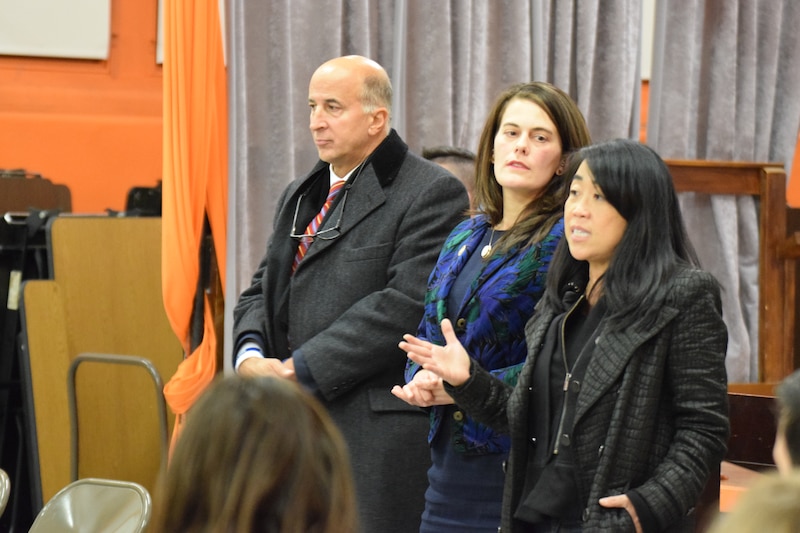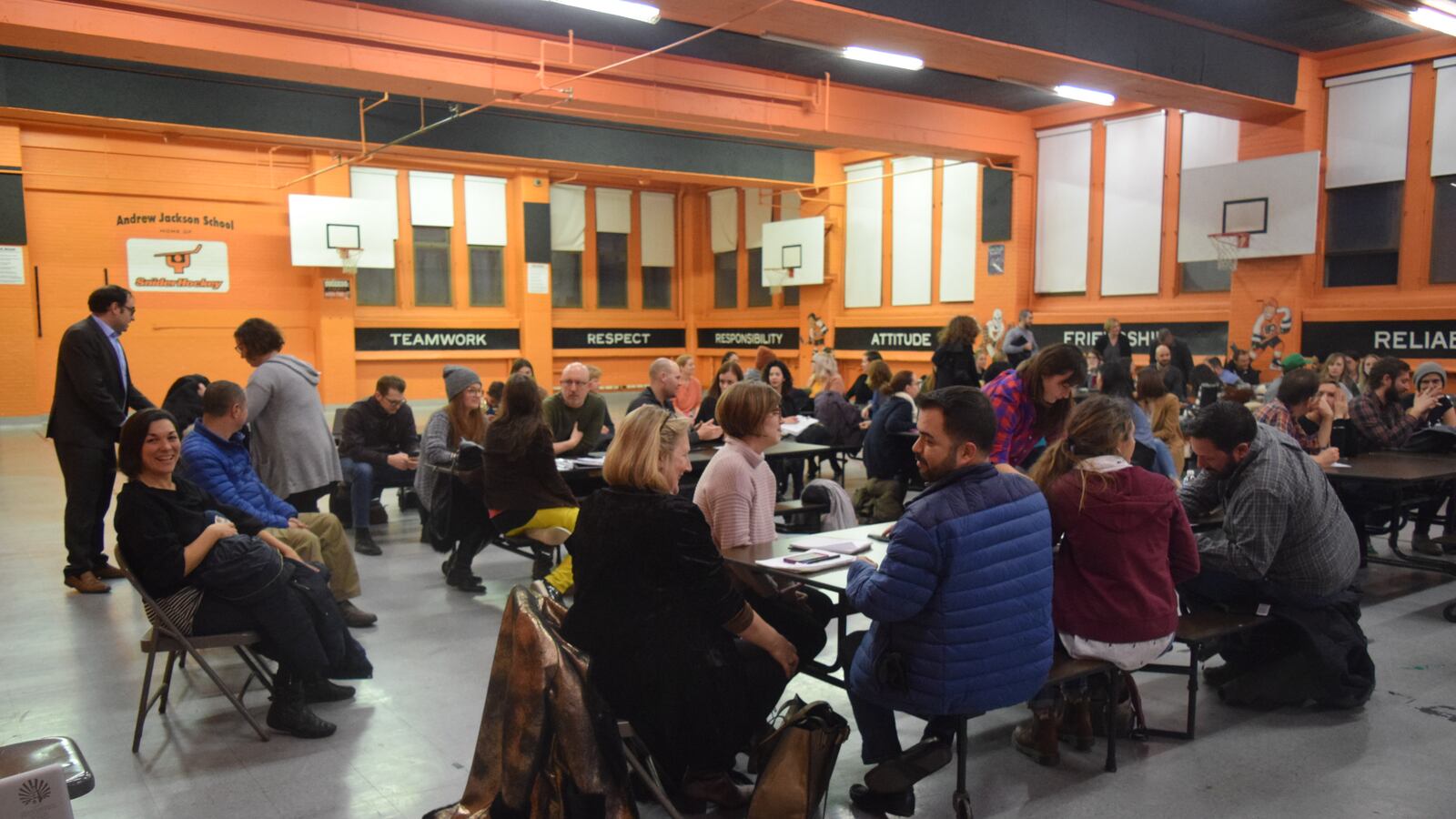This article was originally published in The Notebook. In August 2020, The Notebook became Chalkbeat Philadelphia.
The combined gym and auditorium at Andrew Jackson Elementary School quickly filled up Wednesday night with parents concerned about the school’s lack of space for new students at a meeting with District officials. Jackson sits at 12th and Federal Streets in the heart of South Philadelphia, one of the city’s most rapidly growing and gentrifying neighborhoods.
Jackson was under-enrolled for years. But with the new families moving into the neighborhood, many drawn by the school’s good reputation, Jackson is now so full that it will have to stop accepting students from other neighborhoods to make space for students living nearby. New parents worry that 5-year-olds will be turned away from kindergarten for the first time. District officials assured parents that would not happen – yet.
More than 50 parents and prospective parents attended Wednesday’s meeting, which was a follow-up to a similar December meeting. Both sessions were called by the Home & School Association. Aaron Edelman, the father of two students at the school and treasurer of Jackson’s Home & School, was skeptical of the District’s commitment to solving the problem and said the last meeting was not productive.
“The ongoing re-population of South Philadelphia by families with school-age-children is causing a capacity crisis for the region,” Edelman said. “Despite several years of effort to get traction with the School District, the issue is perpetually at step zero.
“Most South Philly schools are over capacity and continuing to climb wildly. There is little to no hope among the crowd that the District will handle this well, so we are attempting to be very hands-on.”
Jackson first exceeded its capacity in 2016 and has grown each year since. It now has an enrollment of 588, but a capacity of just 550.
Other South Philly K-8 schools are in even worse shape. Even after sending some kindergartners from William Meredith Elementary to nearby George Nebinger Elementary, Meredith’s newly decreased enrollment of 573 is still roughly 100 seats over capacity.
D. Newlin Fell Elementary is also over capacity, and Southwark Elementary just reached capacity. A.S. Jenks Elementary was over capacity in 2015, but enrollment has declined slightly since then. Eliza Kirkbride and George Sharswood Elementary Schools are near capacity and growing steadily each year. Nebinger has grown rapidly and consistently since 2011, though it is still 100 seats under capacity.
Childs, Key, and Vare-Washington are the only South Philadelphia elementary/middle schools that are not over or near capacity.
Short-term and long-term solutions
To solve the immediate problem next school year, the District is making space for another classroom at Jackson by merging three under-enrolled 5th-grade classes into two classes. But parents expressed skepticism that the District would act with urgency on the various long-term solutions that officials proposed.
District officials said they would not move a pre-K program currently located inside the school. They said that many of the program’s children live nearby. Instead, the District is issuing a Request for Proposals for a firm to conduct a demographic study of South Philadelphia to project enrollment growth at each school over the next five to 10 years.
Shawn Bird, the District’s chief schools officer, said the decision not to allow students to transfer into Jackson from other neighborhoods would gradually create 110 seats in the school over the next five years as the current students from other neighborhoods graduate. To the relief of at least one parent in the crowd, the District will not force any of those students to transfer out of Jackson.
But Bird said that all the housing development occurring over those five years will mean those 110 seats likely won’t be enough. That’s why the District wants to conduct the demographic study.
Danielle Floyd, chief operating officer for the District, said the Request for Proposals (RFP) would be shared with Jackson’s principal and School Advisory Council to get feedback before it goes out to bidders. The final bid that the District accepts will be voted on by the Board of Education in June.
After the demographic study is completed, the District will revisit possible long-term solutions that it presented on Wednesday. Floyd hopes to have the results ready for the superintendent to review in November, so that the school community can be consulted about the District’s proposed solutions to be implemented for 2020-21.
Those possible long-term solutions include redrawing catchment areas, building a new neighborhood middle school, or both. Parents had myriad questions about what criteria the District considers when redrawing catchments. Floyd said the biggest factor is distance.
“We look at the District’s policy that students who are 1.5 miles or farther away from school are eligible for transportation,” Floyd said, explaining that the aim is to allow as many students as possible to walk to school. “We look at students’ travel time. … We look at hazardous roads and highways. We coordinate everything with PennDot if kids are going to cross large intersections.”
Floyd contrasted the current process with the rash of school closures in 2013.
“This would allow us to be more forward-thinking,” Floyd said. “When we did our school consolidations in 2012-13, a lot of that was based on historic information around enrollments at a time when we had lost about 70,000 students.”
In other words, those 2013 decisions about how to consolidate neighborhood schools and redraw catchment boundaries were made looking just at the students that had been lost in the past, but not at expected student growth in the future.

District Chief Operating Officer Danielle Floyd answers questions from parents at a meeting at Andrew Jackson Elementary School. (Photo: Greg Windle)
Fernando Trevino, whose child attends Jackson, asked whether diversity was considered. A former deputy director of the Mayor’s Office of Immigrant & Multicultural Affairs, Trevino worked to get Philadelphia recognized as a World Heritage City, and Jackson was the first public school he engaged in that program. He was proud of the school’s diverse student body and wanted to keep it that way. The room of mostly white parents seemed to agree.
Floyd said the District aims to keep student enrollments diverse, both racially and economically.
“We look at certain groups being inadvertently impacted in a way that others are not, whether that’s along racial lines, English language learners or special education students,” she said.
Trevino’s concern is that many rapidly growing South Philly schools are also becoming more white, as working-class families of color are forced out by rising rents and property taxes. Among the over-enrolled schools, the percentage of white students ranges from 20 to 65 percent. Among the near-capacity schools, that percentage of white students ranges from 8 to 23 percent. And the schools that are still significantly under-enrolled are just 5 to 14 percent white.
Karyn Lynch, chief of student support services, had another possible short-term measure to address the crowding at Jackson. She said that a common practice in the District is to allow students who live in the school’s catchment area but then move into another catchment to remain at their initial school. Jackson now has 41 of those students. Lynch said that, if the need arises, the District will “ensure or request” that those students transfer to their new neighborhood school between school years.
“That’s why we’re looking forward to getting an external review of what the trends are going to be – what the needs are going to be – so that we can best prepare,” Lynch said.
The kindergarten shuffle
One of the many mothers who brought her 4-year-year old wanted to know what to do on Jan. 22, when kindergarten registration opens for 2019-20, to enroll her child in one of the 90 coveted seats at the school.
“So the process is we go to Jackson on the 22nd [of January] and get in line,” she said. “So I want to clarify: We go, we show up and it’s first-come, first-serve until 90 seats are filled, and after that, we’re on a wait list? What’s the process? There is a lot of panic around here.”
Lynch answered, saying “the thing we discourage is waiting in line and getting there at 4 a.m.,” referring to past incidents at Penn Alexander and Meredith Schools where parents lined up in the early morning in the middle of winter to secure their child’s seat.
The mother shot back: “Well, that’s probably going to happen here this year.”
Lynch said in schools with large numbers of parents seeking a small number of seats, such as Meredith and Penn Alexander, the District has eventually used a lottery “so that waiting in line does not happen.”

District Chief of Student Support Services Karyn Lynch answers questions from parents at the meeting at Jackson. (Photo: Greg Windle)
The mother was not satisfied, confused about whether the process was first-come, first-serve or a lottery.
“But I’m asking right now, what is the process?” she asked again. “There’s not a lottery, correct? You’re not going to tell us on the 21st [of January] that there is, in fact, a lottery?”
Lynch seemed to equivocate again.
“Today, I can tell you that there is not going to be a lottery, because there will not be 90 kids who show up on the 22nd,” Lynch said.
Parents want accountability
Trevino wanted to know how District officials can be held accountable.
He said he had attended both meetings with school administrators and with officials from District headquarters in which he’s told something in no uncertain terms, only to find out a week later that what he was told was not accurate. For example, both Trevino and another father who attended the December meeting say they were told that the District would relocate the pre-K program at Jackson to make space for two extra classrooms. In Wednesday’s meeting, they were told that option is off the table.
“So, how can we hold you accountable?” Trevino asked.
Lynch mentioned the reporters taking notes and pictures.
“I can tell you that the three of us up here report to someone, who reports to someone, who reports to someone else,” Lynch said. “So I think that is a huge amount of accountability.”
Lynch was referring to their boss, Superintendent William Hite, who works for the Board of Education, which reports to the mayor. The statement implied that every four years, parents get a shot at accountability when they vote to elect a mayor. It was an idea that did not go over well with the crowd.
“Accountability? No, that’s called bureaucracy,” Trevino said after the meeting. “It’s frustrating. They always talk about the long-term.
“We’re talking about building a new school when this one doesn’t even have a parking lot and teachers have to leave the classroom every two hours to find a new parking space.”
Edelman, on the other hand, is hoping for a new school. He thinks it’s the only sustainable solution to the overcrowding throughout South Philly and was happy to see that it’s on the table. But Edelman was also frustrated with the meeting, though he said it went better than the December meeting. At that meeting, Edelman was dismayed when a District official said there were no long-term plans for a solution. And he was glad the RFP process would include the school community. He likes the idea, mentioned by Floyd, that a middle school could be housed in or attached to one of the under-enrolled elementary schools in South Philly.
At the December meeting, Edelman said, much of the focus was on a case study of how the District handled overcrowding in the near Northeast – another growing and, in many places, gentrifying part the city – particularly at Mayfair Elementary. He was not impressed.
“They subdivided classrooms. Then they built trailers in the school’s yard for more classrooms,” he said. “When, after all that, the school reaches about 300 percent capacity and then they decide to build another school [and an expansion].”
Edelman does not want to wait that long. He was also irritated about the exchange over first-come-first-serve kindergarten admission, understanding the stress with his youngest child now in kindergarten.
“They don’t want parents to rush to get a spot thinking that if they get there first they are guaranteed the spot, when the reality is that if you get there first you are guaranteed a spot,” he said. “To call it what it’s not is kind of disingenuous, and denudes everything else they say.”
He was glad to see that this meeting was attended by three local politicians: City Councilman Mark Squilla, City Councilwoman Helen Gym, and recently elected State Rep. Elizabeth Fiedler. They all spoke at the end of the meeting, mentioning all the calls and emails their offices had received from parents. They each encouraged parents to stay involved and keep communicating the issues their schools face.
“The more this room is full to capacity, the more people are going to step up,” Gym said to the parents sitting at lunch tables. “If anyone hears anything more – I know we heard assurances – but we’ll be paying attention to any significant enrollment changes, so please reach out to us.”
Gym said that 15 percent of the city’s schools are over-capacity, and schools everywhere need repairs.
“My number one issue for this upcoming budget is school construction.”

Councilwoman Helen Gym (right) speaks at the meeting at Jackson. Next to her are State Rep. Elizabeth Fiedler and Councilman Mark Squilla. (Photo: Greg Windle)

